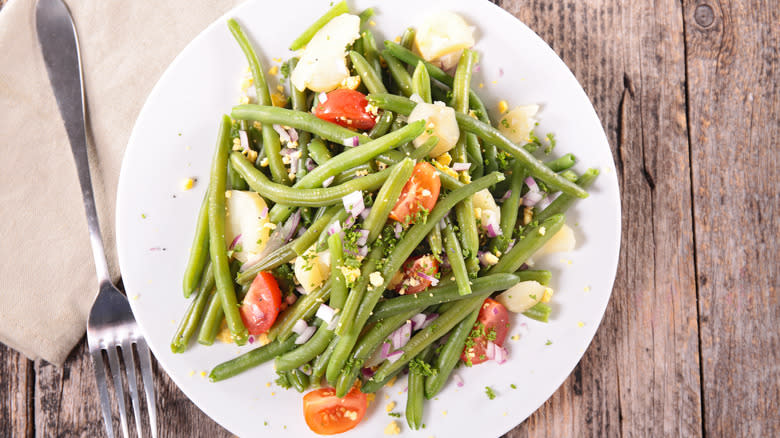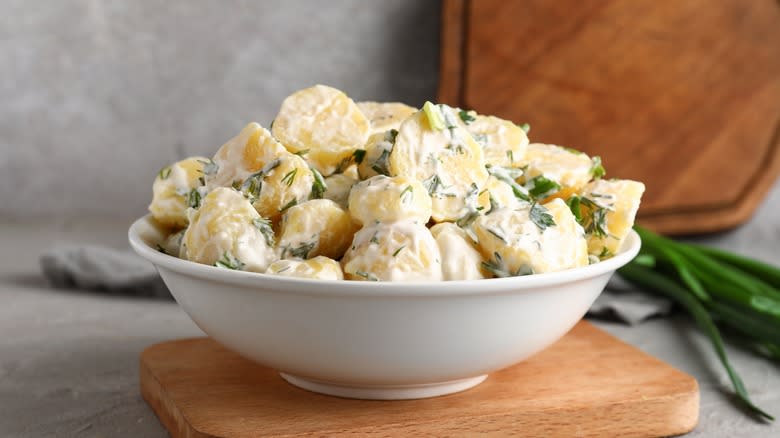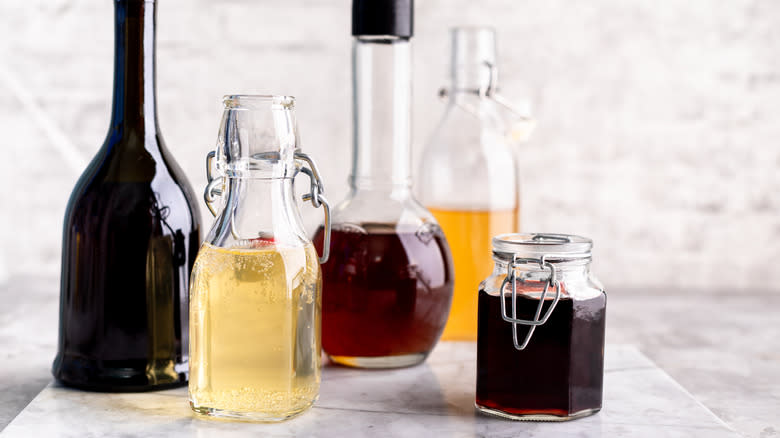Italian Potato Salad Skips The Mayo And Embraces Fresh Ingredients

Home cooks can sometimes get stuck in ruts without ever realizing it. Take a very traditional recipe like potato salad, for instance. While you've probably been open to trying variations on the dish (or, more likely, your tried-and-true, perfect-for-potlucks version) by making an Amish-style potato salad, you might not have ever questioned the dish's creamy essence, created by the addition of mayonnaise. However, potato salads originated long before mayo was even a gleam in a French chef's eye. After all, isn't the freshness of its ingredients the point of most salads?
What if you took a tip from the Italians and made a potato salad with barely-cooked small potatoes and green beans, fresh cherry tomatoes, and a garlicky, herbal vinaigrette? That's the kind of thing that will steer you right out of a culinary rut.
Starchy red potatoes or miniature Yukon Golds are ideal for absorbing neighboring flavors -- especially those conveyed through liquids. Starch is hydrophilic, which means it loves nothing more than to soak up moisture. If the steamed potatoes are dressed with a zingy olive oil-and-red wine vinegar emulsion, redolent with minced garlic, rosemary, flat-leaf parsley, and some olive brine, you do the math. The flavor profile of an Italian potato salad leaves mayo-based versions in the dust.
Read more: French Cooking Tricks You Need In Your Life
A Brief History Of Potato Salad

Sure, Italians will do whatever they want with fresh vegetables, but surely Americans have always loved creamy potato salads, right? Not at all. It's believed that potato salads were introduced into the New World by German immigrants. The earliest written recipes we have for cold American potato salads date from the mid-1800s and are likely of German origin. In them, cooked potatoes are dressed with vinegar, herbs, and a little sugar. (Hot potato salads followed the general rule for most warm salads and contained onions and bacon.)
Mayonnaise was reportedly invented by a French chef in the 1750s, meaning it technically existed during this time. However, it's made from cream and eggs, two ingredients that won't stay safe to eat for very long. Therefore, this creamy ingredient wasn't commercially available in the United States until at least the 1920s, when -- guess what -- it suddenly became a popular addition to salads, particularly the humble potato salad. So, the "traditional" dish made of cooked potatoes, celery, herbs, and mayonnaise is less than a century old.
Vinegar-Based Potato Salad Is A Great Potluck Option

Creaminess is a wonderful, comforting component of food. However, as anyone who has visited a substandard French or Creole restaurant knows, butter and cream work well for disguising food that is otherwise unappealing. If you grow your own food, have access to a farmer's market, or are a discerning produce shopper, you might not want to smother your prized veggies in mayo. Instead, you might want to show them off. An Italian-style potato salad will give you a stunning combination of flavors from vegetables that are scarcely one step removed from the garden, made assertive with a zingy vinaigrette.
This goes double when making potato salad for a potluck or picnic. Leaving a mayonnaise-based dish out in the sun for an hour or two is not a great idea if you think about it. Now, we're not saying it's a good idea to leave any food out in the sun for hours, but consider this: Red wine vinegar is self-preserving. In short, it doesn't need to be refrigerated. Conversely, mayonnaise does need to be refrigerated after it has been opened, per the USDA guidelines. While there's nothing wrong with a mayo-based potato salad, this may give you additional food for thought when contemplating your next summery salad.
Read the original article on Daily Meal.

